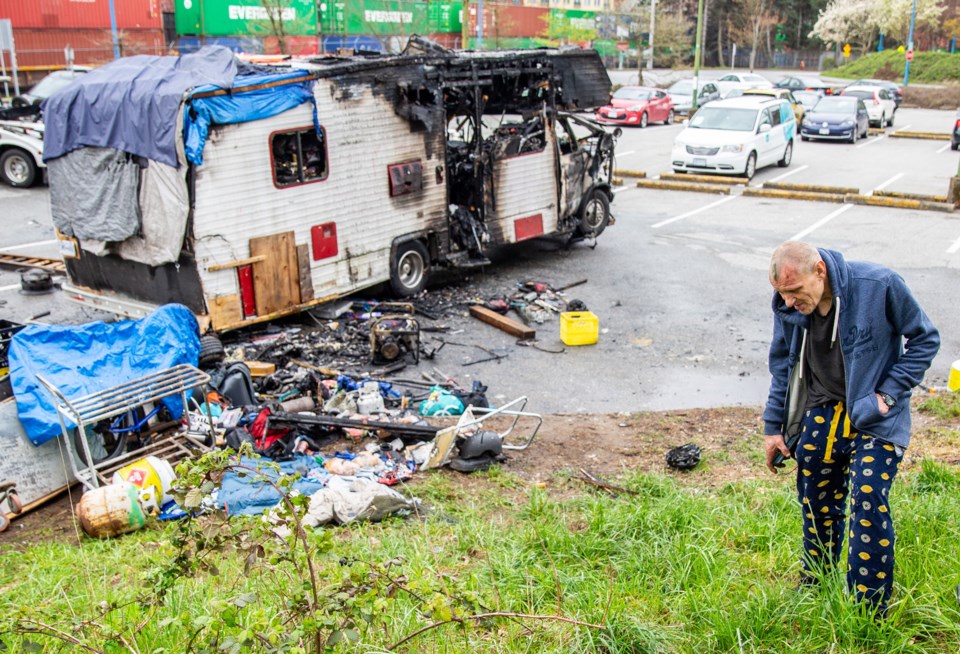Ed wasn’t sure where he will sleep Tuesday night after his recreational vehicle went up in flames in a parking lot near Vancouver’s CRAB Park.
“Just happened an hour ago,” he said Tuesday morning, sifting through a charred mess of his belongings outside his 1989 Ford Citation motorhome.
“Not sure what I’m going to do, where I’m going to go or how I’m going to get rid of this shit.”
Ed believes the fire started from a propane fireplace he kept in his RV to stay warm. The device had worked for the nine months that he used it while parked in the lot on Waterfront Road.
“It should never have happened — the flame was only this high,” he said, gesturing with his thumb and index finger to indicate a small space.
“I don't understand how it went up. The only thing I can think of is that when I closed the door, the air blew something into the fire and caused it to go up.”
When asked what belongings he lost, Ed said there was too much to list but noted he had some expensive coats inside and several bags of clean laundry. He pointed to a charred jacket next to a broom stick outside the RV.
“It’s sitting there right on the ground, all burned up,” he said.
Ed, who suffered a gash on his head during the chaos of the fire, said he was paying Impark $193 per month to park at the lot. He doesn’t have insurance on the vehicle, which was towed away from the scene as he spoke to Glacier Media.
Prior to finding the private lot, which Ed said comes with no parking restrictions, he parked his RV on Glen Street, near Powell Street. Too much hassle from city parking enforcement officers caused him to move, even though it costs him almost $200 per month.
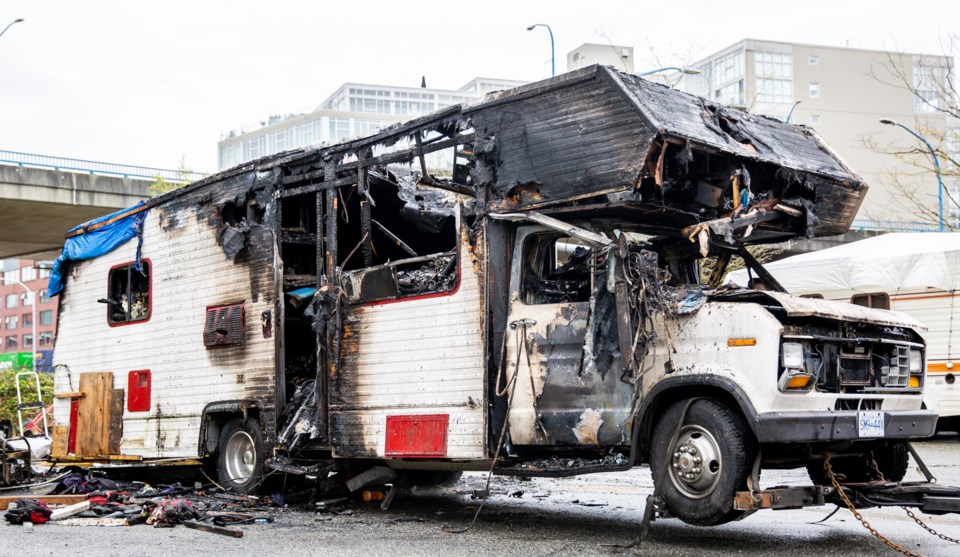
'That's why I bought an RV'
Ed said he had lived in a single-room-occupancy (SRO) hotel on East Hastings but said his door got kicked in several times. He doesn’t want to live in a shelter and doesn’t plan to pitch a tent at neighbouring CRAB Park, where approximately 30 people currently reside.
“That’s why I bought an RV so I didn’t have to live in those shitholes,” he said of the SROs, with many of the buildings notorious for poor living conditions and crime.
Firefighters from the nearby No. 2 fire hall responded to the RV blaze just before 9:30 a.m., said Capt. Matthew Trudeau, the public information officer for Vancouver Fire Rescue Services (VFRS).
Trudeau said details Ed shared with Glacier Media were accurate about the probable cause of the fire.
“It sounds like he'd been using [the heating device] for some time, and this happened to be the time that it ignited,” said Trudeau, noting fires in vehicles used as a person’s home are not uncommon in Vancouver.
“I couldn't say at a high frequency, but every few months we're having another van, a camper, RV or modified vehicle for sleeping catch fire.”
A communications manager with the Vancouver park board said Tuesday in an email that “the owner of the burned RV declined an offer of support from VFRS earlier this morning. The City of Vancouver, along with partners, will continue to engage with the owner to see if additional supports can be provided.”
Two BC Housing workers visiting people in the CRAB Park encampment Tuesday said they would check in with Ed to offer assistance. In the meantime, a volunteer from the encampment brought Ed and his friends some clothing and offered them food at the park site.
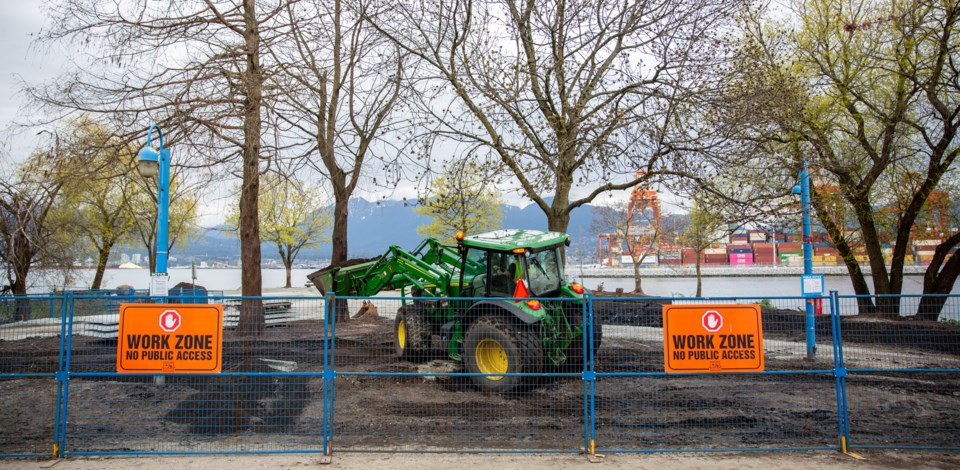
Encampment still being cleaned up
The Impark lot is a short walk to a temporary sheltering area for the residents of the CRAB Park encampment, which was cleared of people last week so park and city crews could clean up the main camp area.
Tents to stay warm, get food and harm reduction supplies have been set up in the sheltering area, which is on a slope adjacent to the original camp; the city and park board often refer to the plot of land on the waterfront peninsula as the “designated” or “daytime” area.
Two washrooms are also nearby, along with areas for garbage and used propane tanks.
The city’s plan had been to allow residents back into the main camp site by the end of last week. Poor weather affected the cleanup schedule, but the grounds are expected to be in shape in a few days and reopen by April 4, according to an email from the park board.
“Priority will be given to those people who had been regularly sheltering overnight in the designated area prior to the cleanup,” the park board said. “Updates about the planned process to move residents back into the designated area will be provided early this week.”
The park board said crews dismantled a series of unsafe, noncompliant structures and removed large quantities of debris and materials. A summary of the amount and type of material removed will be disclosed publicly — possibly later this week — once shared with people who lived in the camp.
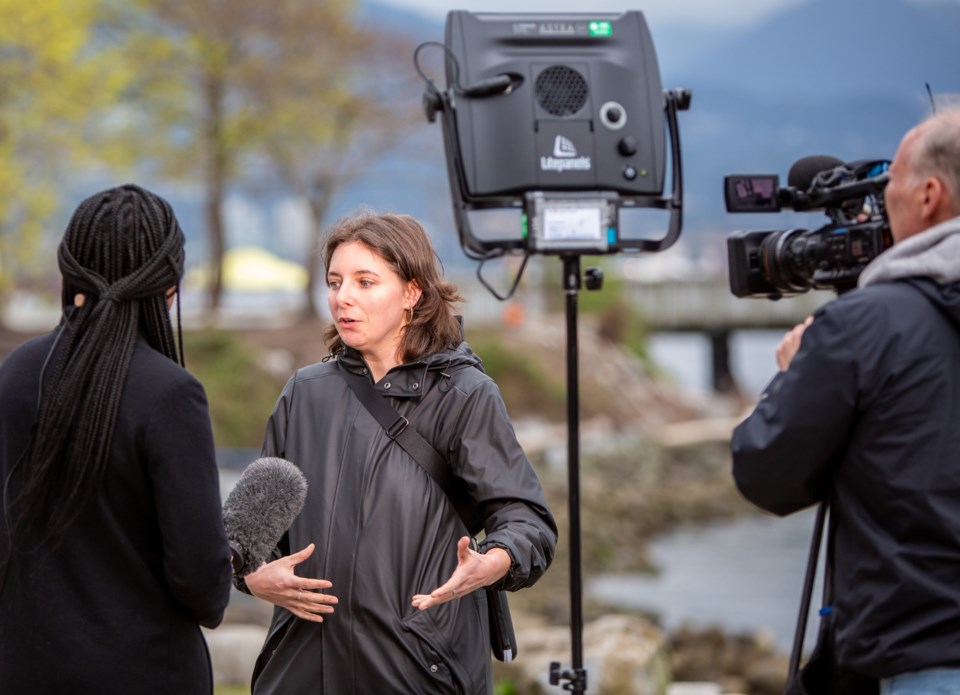
Tiny homes
Michelle Gagnon-Creeley, a volunteer at the encampment, was at the park Tuesday, where she said there are approximately 30 people residing in the temporary sheltering area.
Gagnon-Creeley said she was concerned what type of guidelines — particularly around building materials — that the park board will enforce once residents are allowed to return to the main camp.
“The reality is, people are going to use the resources that they have,” she said.
“So if they can afford a tent, or if they're being provided a tent, that's amazing. But if they can't do that, and they're able to find wood — or if they want to reinforce their home because it's raining or snowing or for whatever reason — sometimes the tent just isn't enough for their lived experience [and material has to be added].”
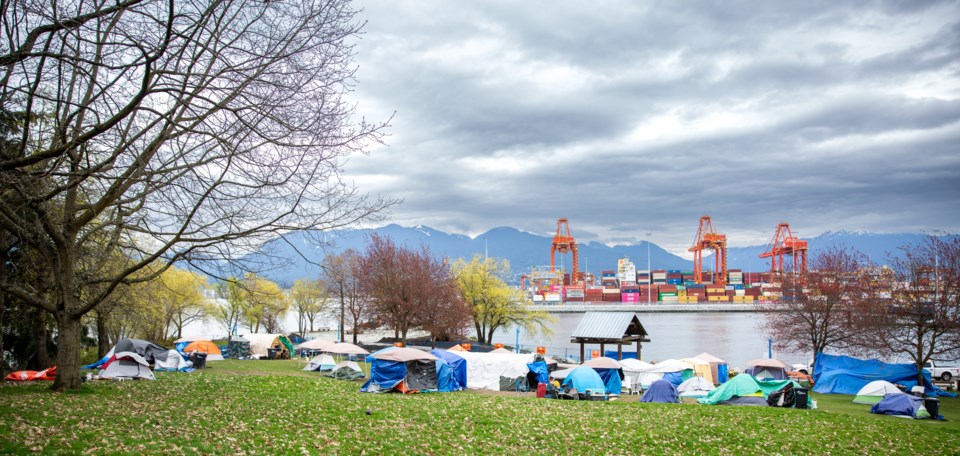
'Housing crisis'
Gagnon-Creeley said she agreed with a solution put forward last week by former city councillor Jean Swanson, who suggested a vacant parking lot to the west of the main camp be rented from the Vancouver Port Authority and populated with tiny homes.
“That parking lot is a great example of an underutilized space within the city that could be used in the meantime to build tiny homes, or temporary shelters, that would be safer than tents and more protected from the elements,” she said, noting washroom/shower trailers — as used at the former Strathcona Park encampment — could be set up on the site.
Added Gagnon-Creeley: “I don't think anybody wants to live in an encampment, but the reality is we’re in a housing crisis and there's no interim solution right now. It’s great that we're building housing [in the city] — and I can't wait for that to happen — but there is this in-between period where folks are still living on the street, and they still need support services, and they still need to live and survive.”
Ed, meanwhile, said he was going to find a place to get cleaned up Tuesday and figure out his next move.
